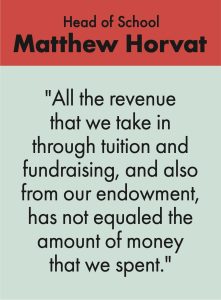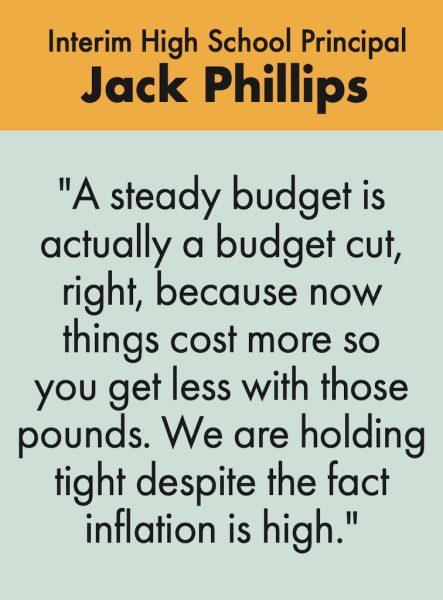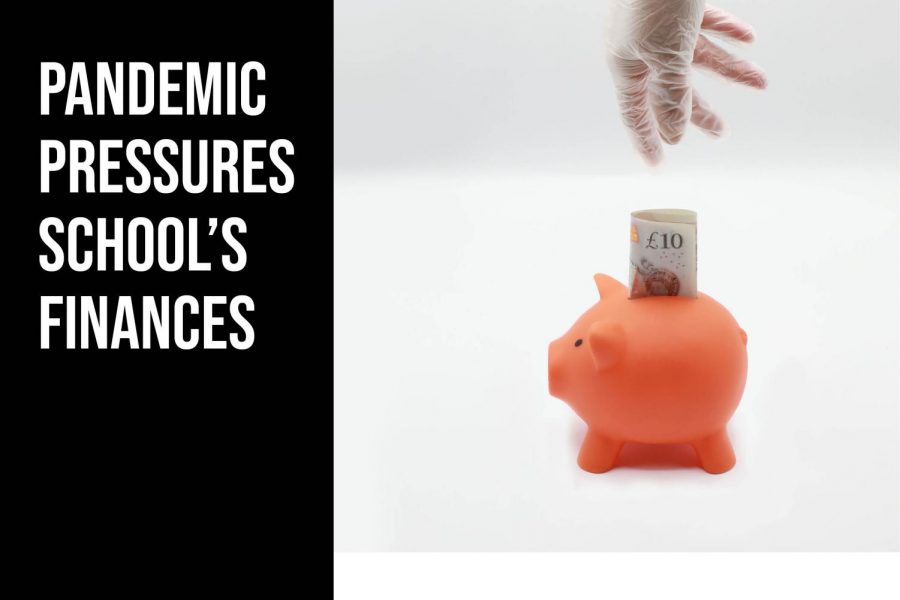Following the Funds: An inside look into the High School’s finances

*Editor’s note: In advance of meetings held by Head of School Matthew Horvat addressing the state of the school June 4 and June 6, The Standard is republishing this article from our March 2024 issue.
Head of School Matthew Horvat said after the U.K. inflation rate surged to 11.1% in October 2022, according the Office for National Statistics, the school’s finances suffered.
“For the last couple of years, the school has had a deficit,” Horvat said. “All the revenue that we take in through tuition and fundraising, and also from our endowment, has not equaled the amount of money that we spent.”

In the 2023-24 year, the school projected it will run a financial deficit of £495,000, according to Horvat. The school previously lost £1.6 million during the 2022-23 year and £1.36 million during the 2021-22 year.
Besides inflation, Horvat said freezing the school tuition from 2020-22 while increasing salaries by 3% in 2020-21 – which make up roughly 75% of the budget – exacerbated the school’s financial strain.
“When we didn’t [increase tuition] for two years, there was one of those two years where we actually also increased salaries, so we didn’t take in any additional revenue, but we were paying out more for teachers,” Horvat said. “That’s a good thing to do if you want to retain high-quality people, but that put the school further behind as far as the budget was concerned.”

Moreover, Horvat said the school had to pay roughly £600,000 in VAT backlog, potentially more if HM Revenue enacts penalties, after failing to pay tax on services from the U.S. 2003-19. Horvat also said the Ofsted inspections and Head of School transition contributed to the current financial situation.
Accounts Assistant Kimiya Kazem Tabrizi said the school takes a proactive approach when forming the yearly budget and makes the decision at least one year ahead of time.
“We look at a mixture of past spending, and then we also liaise with the budget holders, which includes the heads of departments and the principals, to kind of gauge where they plan to take the curriculum in the coming year,” Kazem Tabrizi said.
Nonetheless, Kazem Tabrizi said the school does not solely rely on historical data as it’s not always “a good indicator of the future,” and takes a more dynamic outlook.
Horvat said while the school has savings obtained from previous budget surpluses, these savings will not be enough to cover the current deficit.
“We’re using those past budget surpluses to, in essence, deal with the deficits that we have right now,” Horvat said. “But, at this point, we’ve used all those surpluses on the deficits that we’ve had, so like, we don’t have that resource anymore. We can’t use next year’s deposits to fund this year’s operations because … financially that’s really problematic.”
In order to cover the deficit, Horvat said the school’s first step was to increase tuition by 9.7% to £38,000 for the 2023-24 school year, up from £34,700 the year prior.
“Students weren’t really here [during COVID-19], and so I think the school felt like we really can’t increase tuition because of that, but that had a lasting effect as well as with the increase in inflation,” Horvat said. “We’re in the spot now where we have to just sort of adjust some of our costs.”
Furthermore, Horvat said the school aims to reduce spending by 3% in the 2023-24 school year to minimize costs.
Kazem Tabrizi said the spending reduction is a target for the school rather than a forceful cutback.
“In terms of the 3% decrease, it’s a goal in terms of spending, so it’s not necessarily a budget cut,” Kazem Tabrizi said. “It’s a goal that our Head of School has set for all of the budget holders to aim for, and hopefully we can achieve that this year.”
Interim High School Principal Jack Phillips said the 3% spending decrease will not impact the student experience.
“We’ve made a commitment to not impact programming, student programming,” Phillips said. “We haven’t made any cutbacks that any [students] would really notice.”
However, Phillips said by not adjusting the budget to keep up with inflation, the school is effectively cutting back.
“A steady budget is actually a budget cut, right, because now things cost more and so you get less with those pounds,” Phillips said. “We are holding tight despite the fact that inflation is high.”
By implementing the cut, Kazem Tabrizi said the school will become more fiscally responsible.
“It forces you to take a closer look at where you’re spending and whether or not everything is absolutely necessary,” Kazem Tabrizi said. “At the same time, though, you don’t want to compromise the quality of teaching.”
Phillips said the school is cutting back on excess spending by removing funding for nonessential activities.
“There are some things though that we’d like to get back that we’re sort of tightening the belt around,” Phillips said. “If I were to say, ‘Hey teachers, each department, we’re gonna give you a little bit of a budget to go to Starbucks,’ I’m not doing that now. That’s the kind of thing where we are being mindful of the cuts that are made.”
For example, Phillips said the High School is looking to scale down unnecessary catering expenses, which make up 3% of the yearly High School budget.
“We spent an inordinate amount of money on pizza last year,” Phillips said. “We were throwing pizza at everything. Every kind of student gathering, we had pizza, so we are doing that less now.”
Besides the school-wide budget decrease, Horvat said reevaluating which positions are needed could be another way to minimize costs. He said this includes merging the Director of Operations and Director of Finance positions into one role.
“We have turnover with our Director of Facilities and Operations and our Director of Finance, so they’re both leaving and we’re going to combine that position into one,” Horvat said. “We’ll save a little bit on the salaries because, obviously, you’re not going to pay one person the salary of two people.”
Moreover, Phillips said the school is looking to decrease spending by reducing printing costs for graduation and eliminating redundant physical magazine subscriptions in the library.
Within the High School, Phillips said the budget is broken up between different cost centers, which are departments within an organization to which costs can be allocated. Each cost center, which includes the five departments in the High School, receive an annual stipend of money to be spent by its budget holder, who is someone in charge of the cost center’s budget.
For the 2023-24 school year, the High School budget is £459,200, excluding salaries, benefits or trips, according to Phillips. Within the budget, 31% is allocated toward the five departments – Social Studies, Math, World Languages, English and Science – with the rest paying for robotics, prom, graduation, publications and other extraneous expenses.
Kazem Tabrizi said the amount of funding each cost center receives differs depending on the size of the department and the cost of teaching the curriculum.
“There are departments that are bigger than others, and therefore they definitely require more money than others because of just the number of kids that do them and like the burden of actually teaching them,” Kazem Tabrizi said. “For example, robotics, as you know, could be more expensive than a course that only requires textbooks, so that’s how it’s actually decided.”
For instance, Phillips said the world languages department budget fluctuates to accommodate textbook subscription costs.
“The language department is on a cycle to buy new textbooks,” Phillips said. “That happens every five years, and so when it’s that five years, we know we’re going to have to make this purchase, so we allocate more money to them for that specific year.”
Kazem Tabrizi said budget holders hold significant sway when distributing funds.
“We really rely a lot on the budget holders because they’re the best experts, the teachers and the people who are so close to everyday teaching that they know what to expect what there’s going to be the next year in terms of spending,” Kazem Tabrizi said.
Correspondingly, Math Department Head and budget holder David Hill said while the school ultimately assigns the budget, departments have some influence.
“Historically, they have looked at how most departments spend money, and so they kind of have set amounts of money that they have for each itemized thing in our budget,” Hill said. “Most of our money is allocated to textbooks, but we do have the power to move that around.”
Nonetheless, Phillips said the school generally allocates its money through zero-based budgeting.
“In general, schools and nonprofits work on what’s called zero-based budgeting, the idea that you’re assigned to allocate a certain amount of money at the beginning of the school year and you do not get to save it and put it into next year,” Phillips said. “So, if you don’t spend it all, you don’t spend it all.”

Besides zero-based budgeting, Phillips said the school takes long-term priorities, such as a desire to strengthen certain academic subjects’ standing, into account when allocating money.
In terms of the 3% decrease, Phillips said he is aiming to take it all out of the High School administration’s budget in order to preserve the departments’ budgets.
“Those departmental budgets like social studies and math are directly related to programs, so I know if I can just not touch them that we’re not cutting programs and I can just cut other things,” Phillips said.
Computer Science Department Head and budget holder Livia Piloto said the computer science department, in addition to its budget, is operating with a gift, allowing it to bypass some of the spending decreases.
“We’re in a very unique position for the past couple of years due to the wonderful, generous gift that we got, so a lot of the bigger expenditures are getting spent there,” Piloto said.
According to Piloto, the school received a £1 million gift in 2021 to be used across three years to expand the computer science program throughout K-12. High School Technology Coordinator Mark Scharen, who is partly in charge of the gift money, said the money can be allocated to six specific categories, which include professional development, integration of computer science and computational thinking skills and innovation and research, among others.
As such, Piloto said the department must exercise caution when using gift money by evaluating each purchase against the designated categories.
“There’s a lot of steps that we have to do to be able to purchase something, and it has to be meaningful,” Piloto said.
Nonetheless, Piloto said, after receiving recommendations from the school, the computer science department has taken measures to reduce overspending.
“We have been asked to not go overboard,” Piloto said. “Additionally, like we can’t spend too much on team building stuff. Within our department, in the past, we were able to do a Christmas dinner out or something like that, and now we’re not doing that because we’re trying to save and then most of the money is going to [the students].”
Likewise, World Languages Department Head and budget holder Annie Yousey said the world languages department is decreasing future expenditures.
“We’ve all been asked to spend less, and we haven’t cut anything out that we were already using or doing,” Yousey said. “We just haven’t been able to add as much as we wanted.”
Specifically, Yousey said the spending decrease has affected the department’s ability to host special events, such as inviting guest speakers to class or going on more excursions.
“We just have to look at those things on an individual basis and see if we can do them, and for the most part we still have been able to,” Yousey said. “I think there isn’t the feeling that we can do as much, so we’re trying to be conservative, we’re trying to respect what the school has asked.”
However, Hill said the budget cuts have not impacted the math department.
“Luckily, it hasn’t impacted us because we are perennially under budget,” Hill said. “I do notice that the budget doesn’t change, so that definitely doesn’t account for inflation, but because we never spend close to the amount we’re allocated, … it’s usually not an issue.”
Hill said the math department spends a majority of its budget on competitions like the U.K. Mathematics Trust Competition instead of textbooks, which is “usually not a lot of money.”
As a result of the department’s underspending, Hill said it is unjust to force the spending decrease equally among all departments.
“We are always under budget, so the directive to cut back because as a whole we’re overspending I think would be unfairly applied to us,” Hill said. “We’re spending the amount of money that we feel is core to what we do, and so cutting back is neither necessary nor is it appropriate because we’re not overdoing it.”
Similar to academic departments within the High School, Director of Community Action Brandon Block said the community service program is also given an annual budget.
>Block said the majority of the allocated budget goes into the community partnership program, but some money is also set aside for the West London MUN and youngPOWER conferences. However, Block said the Community Volunteer Days are primarily supported by the Parent Community Association, not the High School’s budget.
Block said participation is the primary factor in determining which partnerships receive the most money.
“It really is about student involvement levels and student enthusiasm,” Block said. “A huge proportion of it is in the community partnership programs, and we try to support programs that have a good amount of student enthusiasm. Those tend to get the most involvement and to the degree that we can, the most funding.”
High School Learning Specialist and Alternatives Coordinator Yulisa Cruz said each Alternative operates with a set amount of funding dependent on the number of students on that trip.
“Each student has a certain amount of money that’s allocated to them, and within that money, the trip leader has to be able to pay for travel and housing and food and activities,” Cruz said. “It’s a lot of things expected from a fixed amount of money.”
Furthermore, Cruz said the budget for each Alternative trip can vary depending on each trip’s location and activities. However, Cruz said since the budget is a fixed amount, teachers have to be “very creative with finding free things.”
Due to inflation, Block said the community service program has encountered rising transportation costs.
“That’s been an area that you know, we’re sensitive to and aware of,” Block said. “One of the things that we’re considering going forward is, ‘Is there a way to have programs that are clustered so that a van can bring multiple groups to different sites in one journey?’”
Moreover, Block said the program is aiming to reduce transportation costs to meet the school-wide 3% spending decrease, which includes trying to host more programs that are close to the school.
Likewise, Director of Athletics John Farmer said the costs of bussing sports teams have risen.
“Buses are outrageously expensive and don’t allow us to always do what we want, and so we think creatively about how to get people places without having to rely on private busing all the time,” Farmer said. “Overall, they’re like 40% more [expensive] now than they were two years ago.”
Besides transportation, Block said the program is also looking to merge volunteer opportunities to save on costs.
“One thing that we’re looking at is reducing some of the offers or consolidating offers in the spring so that if we’re able to still give students the opportunity, we may eliminate some programs,” Block said. “If we have two programs, one that has five kids and the other is five but the site can take ten, we may combine those into one program for the ten.”
Cruz said since the Alternatives budget has not increased in recent years, the program is becoming more cost-sensitive.
“The amount of money required to pay for travel and items has increased, but the budget has not increased,” Cruz said. “So we are going to have to do the same but with it seeming like less money, you know, the amount has not changed but because things are more expensive that’s impacting.”
Correspondingly, Farmer said managing the athletics budget with rising inflation poses a challenge.
“One of the biggest challenges of overseeing the athletics department is the growing athletics department with a relatively shrinking budget, meaning the budget’s the same, but things are more expensive and we have more teams, and so trying to make all that work is challenging,” Farmer said.
If inflation continues to rise, Cruz said Alternative trip leaders will have to “be creative” when finding ways to work around increasing costs while sticking to their allocated budget, such as brainstorming new destinations or making purchases earlier.
In the long run, Horvat said the school will have to be more conscientious about their overall expenses.
“I do think we have to become a little more efficient, like I think that that’s just the reality,” Horvat said. “That will get us out of this situation, and then I think we’ll just have to run the organization just a little more carefully with how we use resources.”
Similarly, Phillips said the school is “not in financial danger,” and the 3% decrease is only aimed to get the school “back on track.”
“It really is with a scalpel,” Phillips said. “It’s not like big across-the-board kinds of changes.”





